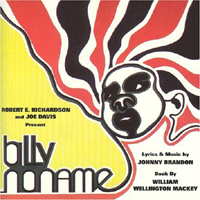 Original Off-Broadway Cast, 1970 (Roulette/Original Cast Records)
Original Off-Broadway Cast, 1970 (Roulette/Original Cast Records)  (2 / 5) An interesting autobiography of a fictional black playwright who is frequently angry and sometimes simply yearning, this musical covers his life from conception (in a street rape) through World War II, the civil rights movement, and the death of Martin Luther King (the final song is titled “Burn, Baby, Burn!”). The playwright ponders his role in the struggles of his era, but the ending of the show offers no answers. Of course, it’s impossible to know from the cast album how detailed and skillful William Wellington Mackey’s script is. The songs, by Johnny Brandon, travel confidently through the story’s 30 years, moving easily along with swing, rhythm and blues, early rock, and the sounds of the late 1960s. Although there’s not a lot of dramatic musical writing here, the tunes are mostly vibrant and rhythmic and it’s certainly easy to accept them as the language of these characters. The title role is uncommonly well sung by Donny Burks, and there are fine supporting performances by Alan Weeks, Hattie Winston, and Urylee Leonardos. — David Wolf
(2 / 5) An interesting autobiography of a fictional black playwright who is frequently angry and sometimes simply yearning, this musical covers his life from conception (in a street rape) through World War II, the civil rights movement, and the death of Martin Luther King (the final song is titled “Burn, Baby, Burn!”). The playwright ponders his role in the struggles of his era, but the ending of the show offers no answers. Of course, it’s impossible to know from the cast album how detailed and skillful William Wellington Mackey’s script is. The songs, by Johnny Brandon, travel confidently through the story’s 30 years, moving easily along with swing, rhythm and blues, early rock, and the sounds of the late 1960s. Although there’s not a lot of dramatic musical writing here, the tunes are mostly vibrant and rhythmic and it’s certainly easy to accept them as the language of these characters. The title role is uncommonly well sung by Donny Burks, and there are fine supporting performances by Alan Weeks, Hattie Winston, and Urylee Leonardos. — David Wolf
Category Archives: A-C
Billion Dollar Baby
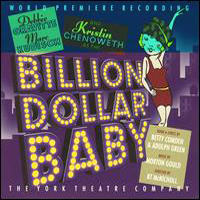 World Premiere Recording, 2000 (Original Cast Records)
World Premiere Recording, 2000 (Original Cast Records)  (1 / 5) Betty Comden and Adolph Green followed On the Town with this disappointment, a satire of the 1920s. Except for a dance sequence that appeared in Jerome Robbins’ Broadway, the 1945 show was largely forgotten until a staged concert performance at the York Theatre led to this recording. In the title role, Kristin Chenoweth chisels her way to the top, going from failed beauty-contest entrant to gangster’s moll and landing a billionaire just as the stock market crashes. Among her victims are Debbie Gravitte as a Texas Guinan-like nightclub owner, Marc Kudisch as a mob figure, and Richard B. Shull as the bank account of her dreams. In general, Morton Gould’s score lacks distinction, and the many dance interludes have been condensed in James Bassi’s four-piece orchestrations. The celebrated Comden and Green wit isn’t always in evidence, but Gravitte gets the best numbers — “Broadway Blossom” and “Havin’ a Time” — and Kudisch delivers a jazzy item called “Bad Timing.” Considering that she has the title role, Chenoweth has relatively little to do (the part was written for dancer Joan McCracken), and her numbers, including “Dreams Come True” and “Faithless,” are forgettable. Still, even if this show is no lost classic, fans of the cast members and of Comden and Green will want to give the CD a spin. — David Barbour
(1 / 5) Betty Comden and Adolph Green followed On the Town with this disappointment, a satire of the 1920s. Except for a dance sequence that appeared in Jerome Robbins’ Broadway, the 1945 show was largely forgotten until a staged concert performance at the York Theatre led to this recording. In the title role, Kristin Chenoweth chisels her way to the top, going from failed beauty-contest entrant to gangster’s moll and landing a billionaire just as the stock market crashes. Among her victims are Debbie Gravitte as a Texas Guinan-like nightclub owner, Marc Kudisch as a mob figure, and Richard B. Shull as the bank account of her dreams. In general, Morton Gould’s score lacks distinction, and the many dance interludes have been condensed in James Bassi’s four-piece orchestrations. The celebrated Comden and Green wit isn’t always in evidence, but Gravitte gets the best numbers — “Broadway Blossom” and “Havin’ a Time” — and Kudisch delivers a jazzy item called “Bad Timing.” Considering that she has the title role, Chenoweth has relatively little to do (the part was written for dancer Joan McCracken), and her numbers, including “Dreams Come True” and “Faithless,” are forgettable. Still, even if this show is no lost classic, fans of the cast members and of Comden and Green will want to give the CD a spin. — David Barbour
Big River
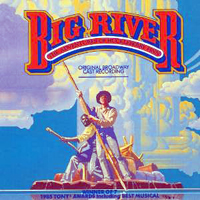 Original Broadway Cast, 1985 (MCA)
Original Broadway Cast, 1985 (MCA)  (3 / 5) Country-music songwriter Roger Miller furnished the score for this musical version of the Mark Twain classic Huckleberry Finn, and the result is a twangy Broadway sound that’s just right for the beloved tale. The rollicking “Muddy Water” and the more serene “River in the Rain” represent Miller at his best, while quirky comic numbers such as “Hand for the Hog” (Tom Sawyer’s tribute to his porcine pals) illustrate why Miller is also well known as a novelty songwriter. His skill as a tunesmith is unimpeachable here — but his lyrics, while frequently quite clever, are sometimes too simplistic or repetitive for a Broadway book musical. “Waitin’ for the Light to Shine,” for instance, may be the show’s most melodically beautiful number, but there’s little to distinguish it from any other gospel song. As far as good show-tune writing is concerned, Miller does prove himself with the lively opener “Do Ya Wanna Go to Heaven?”and the affecting “Leavin’s Not the Only Way to Go.” The finest performances on this disc are by Daniel Jenkins as Huck and Tony Award-winner Ron Richardson as his best friend, the runaway slave Jim. And a pre-Roseanne John Goodman does a memorable turn as Huck’s crazy father, Pap, railing comically against the “Guv’ment.” — Brooke Pierce
(3 / 5) Country-music songwriter Roger Miller furnished the score for this musical version of the Mark Twain classic Huckleberry Finn, and the result is a twangy Broadway sound that’s just right for the beloved tale. The rollicking “Muddy Water” and the more serene “River in the Rain” represent Miller at his best, while quirky comic numbers such as “Hand for the Hog” (Tom Sawyer’s tribute to his porcine pals) illustrate why Miller is also well known as a novelty songwriter. His skill as a tunesmith is unimpeachable here — but his lyrics, while frequently quite clever, are sometimes too simplistic or repetitive for a Broadway book musical. “Waitin’ for the Light to Shine,” for instance, may be the show’s most melodically beautiful number, but there’s little to distinguish it from any other gospel song. As far as good show-tune writing is concerned, Miller does prove himself with the lively opener “Do Ya Wanna Go to Heaven?”and the affecting “Leavin’s Not the Only Way to Go.” The finest performances on this disc are by Daniel Jenkins as Huck and Tony Award-winner Ron Richardson as his best friend, the runaway slave Jim. And a pre-Roseanne John Goodman does a memorable turn as Huck’s crazy father, Pap, railing comically against the “Guv’ment.” — Brooke Pierce
Big
 Original Broadway Cast, 1996 (Universal/Decca)
Original Broadway Cast, 1996 (Universal/Decca)  (1 / 5) Onstage, Big was a textbook example of how a top creative team with all the right intentions could destroy the charm of a beloved film. On disc, the score by Richard Maltby, Jr. and David Shire provides sporadic enjoyment, even if it’s somewhat overbearing. John Weidman’s book closely follows Gary Ross and Anne Spielberg’s screenplay: Josh (Patrick Levis) is a frustrated 12-year-old who wakes up one morning in the body of an adult (Daniel Jenkins). He runs off to New York, becomes a successful toy executive, and falls in love with a colleague named Susan (Crista Moore). The overture starts things off on an exciting note, and the opening number, “Can’t Wait,” sets the right tone of generation-gap exasperation. But the songs tend to dwell on the characters’ feelings when they’re not straining for exuberance; this is especially true of “Fun,” in which Josh kicks up a ruckus at F.A.O. Schwartz with the toy magnate MacMillan (john Cypher). The quieter numbers work best — especially “Stop, Time,” sung by Josh’s mother (Barbara Walsh), and “I Want to Know,” sung by Josh when he realizes that he’s going to spend the night with Susan. There’s also a catchy chorus number, “Cross the Line,” performed at a toy company party. But too much of the score, especially as arranged by Doug Besterman, is bombastic and full of false high spirits. — David Barbour
(1 / 5) Onstage, Big was a textbook example of how a top creative team with all the right intentions could destroy the charm of a beloved film. On disc, the score by Richard Maltby, Jr. and David Shire provides sporadic enjoyment, even if it’s somewhat overbearing. John Weidman’s book closely follows Gary Ross and Anne Spielberg’s screenplay: Josh (Patrick Levis) is a frustrated 12-year-old who wakes up one morning in the body of an adult (Daniel Jenkins). He runs off to New York, becomes a successful toy executive, and falls in love with a colleague named Susan (Crista Moore). The overture starts things off on an exciting note, and the opening number, “Can’t Wait,” sets the right tone of generation-gap exasperation. But the songs tend to dwell on the characters’ feelings when they’re not straining for exuberance; this is especially true of “Fun,” in which Josh kicks up a ruckus at F.A.O. Schwartz with the toy magnate MacMillan (john Cypher). The quieter numbers work best — especially “Stop, Time,” sung by Josh’s mother (Barbara Walsh), and “I Want to Know,” sung by Josh when he realizes that he’s going to spend the night with Susan. There’s also a catchy chorus number, “Cross the Line,” performed at a toy company party. But too much of the score, especially as arranged by Doug Besterman, is bombastic and full of false high spirits. — David Barbour
As Thousands Cheer
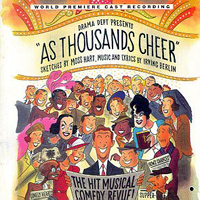 Off Broadway Cast, 1998 (Varèse Sarabande)
Off Broadway Cast, 1998 (Varèse Sarabande)  (4 / 5) At a time when large-scale revues were part of the standard traffic on Broadway, Irving Berlin’s As Thousands Cheer was a Bentley. It had great stars, terrific songs, and clever sketches, all with a specific focus: The show was a Sunday newspaper come to life, its varied components commenting on or illustrating topical stories, Hollywood gossip, comic strips, and even the weather report (“Heat Wave”). If anyone wonders about that “rotogravure” line in “Easter Parade,” this show provides an explanation. Original cast members Clifton Webb and Ethel Waters left recorded souvenirs of the show, and nothing will ever top Waters’ performances of “Harlem on My Mind” and “Heat Wave.” (She did not record the devastating “Supper Time” until years later.) The show itself remained an irretrievable legend until 1998, when a “revival” was produced Off-Broadway by the scrappy and inventive Drama Dept. Wisely, there was no attempt to reproduce the show as it was originally, or to have modern performers pretend to be Marilyn Miller or Ethel Waters. Instead, the production put Berlin’s songs and some of the show’s original sketches into one zippy act performed by a talented cast of six who constantly shifted roles. The accompaniment was piano and bass. The charm of that production is communicated by this “World Premiere Cast Recording,” as it is labeled, which reverts to the original order of the songs and generously reinstates “Easter Parade” (not heard in the actual revival). Howard McGillin, Judy Kuhn, B.D. Wong, Mary Beth Peil, Kevin Chamberlin, and Paula Newsome sing and cavort with skill and enthusiasm — and if Newsome’s “Supper Time” can’t touch the Waters version, neither can anyone else’s. There’s even an unknown Berlin gem here: “Through a Keyhole,” a moody evocation of a Walter Winchell-esque gossip reporter. The show may sound more like “As Dozens Cheer” in this version, but at least the cheers are heartfelt. — Richard Barrios
(4 / 5) At a time when large-scale revues were part of the standard traffic on Broadway, Irving Berlin’s As Thousands Cheer was a Bentley. It had great stars, terrific songs, and clever sketches, all with a specific focus: The show was a Sunday newspaper come to life, its varied components commenting on or illustrating topical stories, Hollywood gossip, comic strips, and even the weather report (“Heat Wave”). If anyone wonders about that “rotogravure” line in “Easter Parade,” this show provides an explanation. Original cast members Clifton Webb and Ethel Waters left recorded souvenirs of the show, and nothing will ever top Waters’ performances of “Harlem on My Mind” and “Heat Wave.” (She did not record the devastating “Supper Time” until years later.) The show itself remained an irretrievable legend until 1998, when a “revival” was produced Off-Broadway by the scrappy and inventive Drama Dept. Wisely, there was no attempt to reproduce the show as it was originally, or to have modern performers pretend to be Marilyn Miller or Ethel Waters. Instead, the production put Berlin’s songs and some of the show’s original sketches into one zippy act performed by a talented cast of six who constantly shifted roles. The accompaniment was piano and bass. The charm of that production is communicated by this “World Premiere Cast Recording,” as it is labeled, which reverts to the original order of the songs and generously reinstates “Easter Parade” (not heard in the actual revival). Howard McGillin, Judy Kuhn, B.D. Wong, Mary Beth Peil, Kevin Chamberlin, and Paula Newsome sing and cavort with skill and enthusiasm — and if Newsome’s “Supper Time” can’t touch the Waters version, neither can anyone else’s. There’s even an unknown Berlin gem here: “Through a Keyhole,” a moody evocation of a Walter Winchell-esque gossip reporter. The show may sound more like “As Dozens Cheer” in this version, but at least the cheers are heartfelt. — Richard Barrios
The Best Little Whorehouse Goes Public
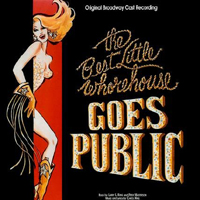 Original Broadway Cast, 1994 (Varèse Sarabande)
Original Broadway Cast, 1994 (Varèse Sarabande)  (3 / 5) Those looking for a guilty treat can seek out this cast album of a show that ran for only 15 performances on Broadway in 1994. The sequel to the long-running smash The Best Little Whorehouse in Texas reunited that show’s creators: songwriter Carol Hall, director-choreographer Tommy Tune, and book writers Larry L. King and Peter Masterson. Whatever problems the show may have had onstage, the well-produced recording is brassy, occasionally campy, and full of enjoyable music. Hall’s score alternates between country-style melodies and a lush Vegas sound. If you think you’d enjoy hearing a Broadway chorus chanting “Keep It Up for A. Harry Hardast,” this album belongs on your shelf. The opening number, “Let the Devil Take Us,” bursts with old-time Broadway vitality. Throughout, the performers sound like they’re having fun, even if they collectively press the gas pedal all the way to the floor in an effort to make the show work. The wink-nudge jokes and showbiz tricks pile up, and the dialogue swatches on the CD — as well as the notes in the accompanying booklet — convey an idea of the plot’s complexities. But by the time the recording ends with a patriotic flourish and a medley-style curtain call, only the most stone-hearted will not be at least partly won over. Dee Hoty sings “Picture Show” with a smile in her voice, puts over “I’m Leavin’ Texas” well, effectively superintends the phone-sex number “Call Me,” and has a charming duet with Scott Holmes, “It’s Been a While.” Peter Matz (orchestrations) and Wally Harper (vocal and dance arrangements) do excellent teamwork; just listen to the “Bankity-Bank” section of “I’m Leavin’ Texas,” and you’ll hear how the creativity of these two men gives the music a slick sheen. — Morgan Sills
(3 / 5) Those looking for a guilty treat can seek out this cast album of a show that ran for only 15 performances on Broadway in 1994. The sequel to the long-running smash The Best Little Whorehouse in Texas reunited that show’s creators: songwriter Carol Hall, director-choreographer Tommy Tune, and book writers Larry L. King and Peter Masterson. Whatever problems the show may have had onstage, the well-produced recording is brassy, occasionally campy, and full of enjoyable music. Hall’s score alternates between country-style melodies and a lush Vegas sound. If you think you’d enjoy hearing a Broadway chorus chanting “Keep It Up for A. Harry Hardast,” this album belongs on your shelf. The opening number, “Let the Devil Take Us,” bursts with old-time Broadway vitality. Throughout, the performers sound like they’re having fun, even if they collectively press the gas pedal all the way to the floor in an effort to make the show work. The wink-nudge jokes and showbiz tricks pile up, and the dialogue swatches on the CD — as well as the notes in the accompanying booklet — convey an idea of the plot’s complexities. But by the time the recording ends with a patriotic flourish and a medley-style curtain call, only the most stone-hearted will not be at least partly won over. Dee Hoty sings “Picture Show” with a smile in her voice, puts over “I’m Leavin’ Texas” well, effectively superintends the phone-sex number “Call Me,” and has a charming duet with Scott Holmes, “It’s Been a While.” Peter Matz (orchestrations) and Wally Harper (vocal and dance arrangements) do excellent teamwork; just listen to the “Bankity-Bank” section of “I’m Leavin’ Texas,” and you’ll hear how the creativity of these two men gives the music a slick sheen. — Morgan Sills
The Best Little Whorehouse in Texas
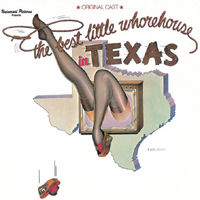 Original Broadway Cast, 1978 (MCA)
Original Broadway Cast, 1978 (MCA)  (4 / 5) On the off chance that you’ve never seen or heard of this show, don’t be put off by its title. Yes, it’s about a house of prostitution and its central character is the brothel’s madam, Miss Mona, but this musical is smart, funny, and sexy rather than stupid and smarmy — in contrast to its flop Broadway sequel. With a book by Larry L. King and Peter Masterson, the based-in-fact story concerns the fallout that occurs when a self-righteous TV personality “exposes” the existence of the Chicken Ranch, a whorehouse that’s been in operation for decades. Carol Hall’s tuneful songs are amusing, heartfelt, and rousing by turns. Among the highlights are the expository songs “20 Fans” and “A Lil’ Ole Bitty Pissant Country Place”; the “Aggie Song,” in which a bunch of horny football players plan their victory celebration at the Chicken Ranch; and “Hard Candy Christmas,” sung by the girls when they learn that the place will soon close. Miss Mona is played by Carlin Glynn — the wife of co-author Masterson, who also co-directed the show with Tommy Tune. Glynn does a bang-up job with such numbers as”Girl, You’re a Woman,” “No Lies”(a sassy duet with Delores Hall as the maid, Jewel), and “The Bus From Amarillo.” There are amusing turns by Clint Allmon as TV snoop Melvin P. Thorpe and Jay Garner as the slick Governor of Texas. Henderson Forsythe as Sheriff Ed Earl delivers his one song, the solid country ballad “Good Old Girl,” with lots of feeling. — Michael Portantiere
(4 / 5) On the off chance that you’ve never seen or heard of this show, don’t be put off by its title. Yes, it’s about a house of prostitution and its central character is the brothel’s madam, Miss Mona, but this musical is smart, funny, and sexy rather than stupid and smarmy — in contrast to its flop Broadway sequel. With a book by Larry L. King and Peter Masterson, the based-in-fact story concerns the fallout that occurs when a self-righteous TV personality “exposes” the existence of the Chicken Ranch, a whorehouse that’s been in operation for decades. Carol Hall’s tuneful songs are amusing, heartfelt, and rousing by turns. Among the highlights are the expository songs “20 Fans” and “A Lil’ Ole Bitty Pissant Country Place”; the “Aggie Song,” in which a bunch of horny football players plan their victory celebration at the Chicken Ranch; and “Hard Candy Christmas,” sung by the girls when they learn that the place will soon close. Miss Mona is played by Carlin Glynn — the wife of co-author Masterson, who also co-directed the show with Tommy Tune. Glynn does a bang-up job with such numbers as”Girl, You’re a Woman,” “No Lies”(a sassy duet with Delores Hall as the maid, Jewel), and “The Bus From Amarillo.” There are amusing turns by Clint Allmon as TV snoop Melvin P. Thorpe and Jay Garner as the slick Governor of Texas. Henderson Forsythe as Sheriff Ed Earl delivers his one song, the solid country ballad “Good Old Girl,” with lots of feeling. — Michael Portantiere
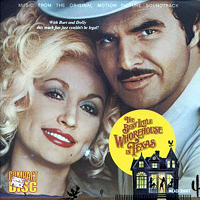 Film Soundtrack, 1982 (MCA)
Film Soundtrack, 1982 (MCA)  (2 / 5) Country-music superstar Dolly Parton was an excellent choice to play Miss Mona in the movie version of Whorehouse. Opposite her is Burt Reynolds, for whom the role of Sheriff Ed Earl was transformed into a younger, more self-involved character. The soundtrack orchestrations are fuller than the stage originals, although not excessively Hollywoodized. The huge mistake made here was the excision of several of Carol Hall’s songs in favor of others written by Parton. Apparently, the star wrote several new songs for the flick, but only the lame Parton-Reynolds duet “Sneakin’ Around” made the final cut; another Parton addition, “I Will Always Love You,” had been written earlier, and several years after the release of the Whorehouse film would become a monster hit for Whitney Houston. The great Theresa Merritt, who plays Jewel in the movie, is only heard here singing a few lines of “A Lil’ Ole Bitty Pissant Country Place.” Fortunately, “Texas Has a Whorehouse in It” was retained — it’s sung by Dom DeLuise as Melvyn P. Thorpe — and the governor’s number, “The Sidestep,” is done to perfection by Charles Durning. — M.P.
(2 / 5) Country-music superstar Dolly Parton was an excellent choice to play Miss Mona in the movie version of Whorehouse. Opposite her is Burt Reynolds, for whom the role of Sheriff Ed Earl was transformed into a younger, more self-involved character. The soundtrack orchestrations are fuller than the stage originals, although not excessively Hollywoodized. The huge mistake made here was the excision of several of Carol Hall’s songs in favor of others written by Parton. Apparently, the star wrote several new songs for the flick, but only the lame Parton-Reynolds duet “Sneakin’ Around” made the final cut; another Parton addition, “I Will Always Love You,” had been written earlier, and several years after the release of the Whorehouse film would become a monster hit for Whitney Houston. The great Theresa Merritt, who plays Jewel in the movie, is only heard here singing a few lines of “A Lil’ Ole Bitty Pissant Country Place.” Fortunately, “Texas Has a Whorehouse in It” was retained — it’s sung by Dom DeLuise as Melvyn P. Thorpe — and the governor’s number, “The Sidestep,” is done to perfection by Charles Durning. — M.P.
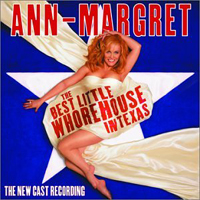 National Tour Cast, 2001 (Fynsworth Alley)
National Tour Cast, 2001 (Fynsworth Alley)  (2 / 5)
(2 / 5)
This recording of a national touring production of Whorehouse that was built around Ann-Margret in the role of Miss Mona has neither the spontaneity of the original Broadway album nor the polish of the film soundtrack. A-M’s work in the tour engendered some negative reviews; the star’s live performances had hitherto been limited to Vegas acts and arena concerts, and she reportedly seemed unsure of herself in a book show. This album gives credence to the charge of tentativeness that was leveled at her. She never really lets go and belts any high notes, which is a disappointment in songs like “A L’il Ole Bitty Pissant Country Place,” “No Lies,” and “The Bus From Amarillo.” Still, A-M works well within her limitations, sounding just fine in the lower-lying sections of the role and employing a sexy, breathy head voice for the higher parts. Even if her vocal performance lacks theatrical energy, it has its own sort of charm. As for the rest of the cast: Gary Sandy as the sheriff is appealing in “Good Old Girl,” Rob Donohue as Melvin P. Thorpe is a stitch in “Texas Has a Whorehouse in It,” Roxie Lucas sings “Doatsy Mae” persuasively, and Avery Sommers has a high old time as Jewel. “A Friend to Me,” a pretty new ballad by Carol Hall, is well rendered by Ann-Margret, and also by Hall herself in a bonus track. (P.S.: The cover art for the recording, featuring A-M in an aggressively sexy pose, is quite ridiculous.) — M.P.
Best Foot Forward
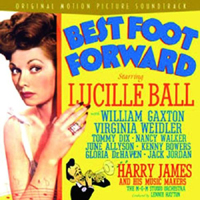 Film Soundtrack, 1943 (Rhino-Turner)
Film Soundtrack, 1943 (Rhino-Turner)  (4 / 5) Good News was the college musical par excellence in the 1920s, and Best Foot Forward did the same for high schools when it opened on Broadway in 1941. The rousing “Buckle Down, Winsocki” became an instant classic, and the show’s young and gifted creators, Hugh Martin and Ralph Blane, promptly moved to Hollywood. Much of the Broadway cast went with them for the unusually faithful movie version, headlined by Lucille Ball (vocals dubbed by Gloria Grafton) and the Harry James orchestra. Among the surprises here are an overture that’s not heard in the film and the added-then-cut “Who Do You Think I Am?” If the James orchestra is decidedly upscale for Winsocki High — “Two O’Clock Jump” is sensational — there is abundant energy in the air, as a talented cast of youthful pros rips through Martin and Blane’s funny and spirited score. Possibly best of all is the young Nancy Walker, who, with June Allyson and Gloria de Haven, makes “The Three B’s” one of the film’s highlights. Tommy Dix, short of stature and big of voice, had a supporting role in the Broadway show but was upgraded to male lead in the movie; his “Buckle Down, Winsocki,” moved to the 11-o’clock spot, is a stirring conclusion to a fine film. — Richard Barrios
(4 / 5) Good News was the college musical par excellence in the 1920s, and Best Foot Forward did the same for high schools when it opened on Broadway in 1941. The rousing “Buckle Down, Winsocki” became an instant classic, and the show’s young and gifted creators, Hugh Martin and Ralph Blane, promptly moved to Hollywood. Much of the Broadway cast went with them for the unusually faithful movie version, headlined by Lucille Ball (vocals dubbed by Gloria Grafton) and the Harry James orchestra. Among the surprises here are an overture that’s not heard in the film and the added-then-cut “Who Do You Think I Am?” If the James orchestra is decidedly upscale for Winsocki High — “Two O’Clock Jump” is sensational — there is abundant energy in the air, as a talented cast of youthful pros rips through Martin and Blane’s funny and spirited score. Possibly best of all is the young Nancy Walker, who, with June Allyson and Gloria de Haven, makes “The Three B’s” one of the film’s highlights. Tommy Dix, short of stature and big of voice, had a supporting role in the Broadway show but was upgraded to male lead in the movie; his “Buckle Down, Winsocki,” moved to the 11-o’clock spot, is a stirring conclusion to a fine film. — Richard Barrios
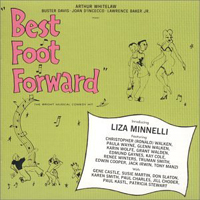 Off-Broadway Cast, 1963 (CAD/DRG)
Off-Broadway Cast, 1963 (CAD/DRG)  (3 / 5) When Best Foot Forward was revived in 1963, Martin and Blane added a sort-of-new song, “You Are for Loving,” originally written for a television production of Meet Me in St. Louis. The interpolation was deemed necessary for a headline-grabber in a supporting role: Liza Minnelli made her New York stage debut at the age of 17 in a well-received production with an energetic young company that also included a pair of brothers named Glenn and Christopher Walken. Judging from this recording, the cast had just the kind of enthusiasm needed for this show. Lead Paula Wayne is particularly attractive in the rueful “Hollywood Story,” and “The Three B’s” is almost as much of a showstopper as it is in the movie. (When Wayne left the show, she was replaced in the role of the washed-up movie star by a real-life washed-up movie star, Veronica Lake.) In the secondary role of Ethel, Liza throws off the show’s balance somewhat, but no complaints can be made over her youthful glow or her integration into the ensemble numbers. With its modest piano accompaniment, this performance has the appropriate air of a high school musical done by an unusually gifted group of students. — R.B.
(3 / 5) When Best Foot Forward was revived in 1963, Martin and Blane added a sort-of-new song, “You Are for Loving,” originally written for a television production of Meet Me in St. Louis. The interpolation was deemed necessary for a headline-grabber in a supporting role: Liza Minnelli made her New York stage debut at the age of 17 in a well-received production with an energetic young company that also included a pair of brothers named Glenn and Christopher Walken. Judging from this recording, the cast had just the kind of enthusiasm needed for this show. Lead Paula Wayne is particularly attractive in the rueful “Hollywood Story,” and “The Three B’s” is almost as much of a showstopper as it is in the movie. (When Wayne left the show, she was replaced in the role of the washed-up movie star by a real-life washed-up movie star, Veronica Lake.) In the secondary role of Ethel, Liza throws off the show’s balance somewhat, but no complaints can be made over her youthful glow or her integration into the ensemble numbers. With its modest piano accompaniment, this performance has the appropriate air of a high school musical done by an unusually gifted group of students. — R.B.
Ben Franklin in Paris
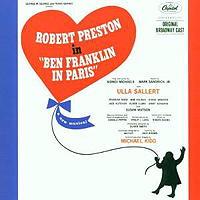 Original Broadway Cast, 1964 (Capito1/DRG)
Original Broadway Cast, 1964 (Capito1/DRG)  (4 / 5) Timing is everything, and this lush show about the life and loves of Benjamin Franklin is an excellent example of the right musical at the wrong time. With its melodic score and literate lyrics, it’s a winsome foray into the mind of Franklin if he had been a musical comedy star as well as a great statesman. But the show is only remembered today as a precursor to the more successful 1776, produced a mere five years later. At any rate, the cast album represents a gem of a lost Broadway musical. It stars Robert Preston, fresh from his stage and screen triumphs in The Music Man; his performance leaps off of the recording and into your lap. The album also features charismatic singing by the Swedish musical theater star Ulla Sallert and the ingenue favorite Susan Watson. Many of the songs by Sidney Michaels and Mark Sandrich, Jr. are topnotch and appropriate to the subject and time period; two numbers, “To Be Alone With You” and “You’re in Paris,” were ghostwritten by the talented young Jerry Herman. Others lapse into a tired operetta genre but, on the whole, this album is a joy to hear and a prime example of showmanship from Broadway’s golden era. — Gerard Alessandrini
(4 / 5) Timing is everything, and this lush show about the life and loves of Benjamin Franklin is an excellent example of the right musical at the wrong time. With its melodic score and literate lyrics, it’s a winsome foray into the mind of Franklin if he had been a musical comedy star as well as a great statesman. But the show is only remembered today as a precursor to the more successful 1776, produced a mere five years later. At any rate, the cast album represents a gem of a lost Broadway musical. It stars Robert Preston, fresh from his stage and screen triumphs in The Music Man; his performance leaps off of the recording and into your lap. The album also features charismatic singing by the Swedish musical theater star Ulla Sallert and the ingenue favorite Susan Watson. Many of the songs by Sidney Michaels and Mark Sandrich, Jr. are topnotch and appropriate to the subject and time period; two numbers, “To Be Alone With You” and “You’re in Paris,” were ghostwritten by the talented young Jerry Herman. Others lapse into a tired operetta genre but, on the whole, this album is a joy to hear and a prime example of showmanship from Broadway’s golden era. — Gerard Alessandrini
Bells Are Ringing
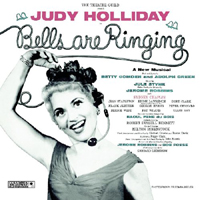 Original Broadway Cast, 1956 (Columbia/Sony)
Original Broadway Cast, 1956 (Columbia/Sony)  (5 / 5) There was only one Judy Holliday, a comic genius who could make you laugh, then break your heart a split second later. Her good friends Betty Comden and Adolph Green provided her with a loving showcase in Bells Are Ringing, and this essential recording preserves one of the great Broadway performances. Holliday stars as Ella Peterson, a lonely operator for the Susanswerphone answering service, who meddles in the lives of her clients. Breaking all the rules, she helps Jeff Moss (Sydney Chaplin), a boozing, self-doubting Broadway playwright, get his career back in order — without revealing her identity. There’s more trouble brewing when another client, Sandor, posing as the head of a classical record company, uses Susanswerphone as the front for a betting ring. This less-than-magisterial plot is fitted out with the most delightful score to come from the long-running partnership of Comden, Green, and Jule Styne. Holliday is given free rein in “It’s a Perfect Relationship,” her fantasy about Jeff; “Is It a Crime?” (her defense of meddling), in which she says that if she’d been around in the days of Romeo and Juliet, “Those two kids would be alive today!”; and the number to end all 11-o’clock numbers, “I’m Going Back.” “Drop That Name,” sung by the chic guests at an Upper East Side party, is a dazzling catalog of celebrities circa 1956, and “The Midas Touch” is a typically funny Comden and Green spoof of nightclub shows. The story’s melancholy undertone comes through in the moving “Long Before I Knew You” and in that ultimate song of resignation, “The Party’s Over.” As Jeff, Sydney Chaplin has a masculine manner and boyish enthusiasm that are real ‘assets, and he partners delightfully with Holliday in the lovely “Just in Time.” Eddie Lawrence is an amusing Sandor — especially when seducing Jean Stapleton as Sue, Ella’s boss and cousin, in the comic waltz “Salzburg.” Peter Gennaro is Holliday’s playmate in the Latin dance spoof “Mu-Cha-Cha.” Robert Russell Bennett’s orchestrations are jaunty and witty. Bonus tracks on the CD include Jule Styne performing “It’s a Perfect Relationship,” “Just in Time,” and the cut song “Boogie, Woogie, Shoogie, Baby.” — David Barbour
(5 / 5) There was only one Judy Holliday, a comic genius who could make you laugh, then break your heart a split second later. Her good friends Betty Comden and Adolph Green provided her with a loving showcase in Bells Are Ringing, and this essential recording preserves one of the great Broadway performances. Holliday stars as Ella Peterson, a lonely operator for the Susanswerphone answering service, who meddles in the lives of her clients. Breaking all the rules, she helps Jeff Moss (Sydney Chaplin), a boozing, self-doubting Broadway playwright, get his career back in order — without revealing her identity. There’s more trouble brewing when another client, Sandor, posing as the head of a classical record company, uses Susanswerphone as the front for a betting ring. This less-than-magisterial plot is fitted out with the most delightful score to come from the long-running partnership of Comden, Green, and Jule Styne. Holliday is given free rein in “It’s a Perfect Relationship,” her fantasy about Jeff; “Is It a Crime?” (her defense of meddling), in which she says that if she’d been around in the days of Romeo and Juliet, “Those two kids would be alive today!”; and the number to end all 11-o’clock numbers, “I’m Going Back.” “Drop That Name,” sung by the chic guests at an Upper East Side party, is a dazzling catalog of celebrities circa 1956, and “The Midas Touch” is a typically funny Comden and Green spoof of nightclub shows. The story’s melancholy undertone comes through in the moving “Long Before I Knew You” and in that ultimate song of resignation, “The Party’s Over.” As Jeff, Sydney Chaplin has a masculine manner and boyish enthusiasm that are real ‘assets, and he partners delightfully with Holliday in the lovely “Just in Time.” Eddie Lawrence is an amusing Sandor — especially when seducing Jean Stapleton as Sue, Ella’s boss and cousin, in the comic waltz “Salzburg.” Peter Gennaro is Holliday’s playmate in the Latin dance spoof “Mu-Cha-Cha.” Robert Russell Bennett’s orchestrations are jaunty and witty. Bonus tracks on the CD include Jule Styne performing “It’s a Perfect Relationship,” “Just in Time,” and the cut song “Boogie, Woogie, Shoogie, Baby.” — David Barbour
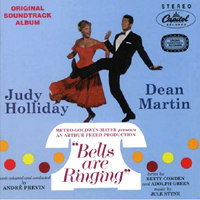 Film Soundtrack, 1960 (CapitollDRG)
Film Soundtrack, 1960 (CapitollDRG)  (2 / 5) The film version of Bells Are Ringing is essential viewing for Holliday’s performance, but the soundtrack album is less interesting. Most of the numbers highlighting Comden and Green’s oddball humor have been cut, including “Is It a Crime?” and “Mu-Cha-Cha.” Much more mysteriously, “Long Before I Knew You” has been eliminated as well. But one nice addition is a jazzy, percussive gem: “Better Than a Dream,” sung by Ella and Jeff at their first meeting. Dean Martin’s crooning as Jeff is a plus, and the two stars sound like they’re having fun in “Just in Time.” If anything, Holliday’s reading of “The Party’s Over” is even more affecting here than on the original recording, and she offers another zesty performance of “I’m Going Back.” Still, it’s not the full score, so stick with the Broadway album. (Note: A very young Hal Linden, who had understudied and replaced Sydney Chaplin on Broadway, turns up as the soloist in “The Midas Touch.”) — D.B.
(2 / 5) The film version of Bells Are Ringing is essential viewing for Holliday’s performance, but the soundtrack album is less interesting. Most of the numbers highlighting Comden and Green’s oddball humor have been cut, including “Is It a Crime?” and “Mu-Cha-Cha.” Much more mysteriously, “Long Before I Knew You” has been eliminated as well. But one nice addition is a jazzy, percussive gem: “Better Than a Dream,” sung by Ella and Jeff at their first meeting. Dean Martin’s crooning as Jeff is a plus, and the two stars sound like they’re having fun in “Just in Time.” If anything, Holliday’s reading of “The Party’s Over” is even more affecting here than on the original recording, and she offers another zesty performance of “I’m Going Back.” Still, it’s not the full score, so stick with the Broadway album. (Note: A very young Hal Linden, who had understudied and replaced Sydney Chaplin on Broadway, turns up as the soloist in “The Midas Touch.”) — D.B.
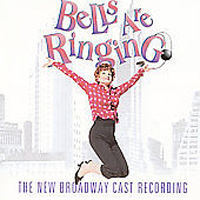 Broadway Cast, 2001 (Fynsworth Alley)
Broadway Cast, 2001 (Fynsworth Alley)  (1 / 5) Faith Prince was at sea in this misbegotten revival, which lacked both hilarity and heart. The disc is much the same; gone are Holliday’s marvelously offhand humor and compelling sadness. Prince projects a tough professionalism that’s at odds with the role of Ella, and her accomplished vocals further rob the character of any vulnerability. However, she does offer a lovely rendition of “The Party’s Over.” Marc Kudisch works much too hard as Jeff, and the strain shows. In the hands of David Garrison and Beth Fowler, the Sandor/Sue subplot falls flat, and Don Sebesky’s brassy, reduced orchestrations pale in comparison to the originals. — D.B.
(1 / 5) Faith Prince was at sea in this misbegotten revival, which lacked both hilarity and heart. The disc is much the same; gone are Holliday’s marvelously offhand humor and compelling sadness. Prince projects a tough professionalism that’s at odds with the role of Ella, and her accomplished vocals further rob the character of any vulnerability. However, she does offer a lovely rendition of “The Party’s Over.” Marc Kudisch works much too hard as Jeff, and the strain shows. In the hands of David Garrison and Beth Fowler, the Sandor/Sue subplot falls flat, and Don Sebesky’s brassy, reduced orchestrations pale in comparison to the originals. — D.B.
Beauty and the Beast
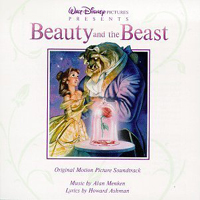 Film Soundtrack, 1991 (Walt Disney Records)
Film Soundtrack, 1991 (Walt Disney Records)  (3 / 5) The soundtrack album of songs from Disney’s highly successful 1991 animated film Beauty and the Beast makes it clear why the material was destined for stage adaptation. (See below.) Paige O’Hara, with her vibrant Broadway belt, is full of warmth as Belle, Jerry Orbach is a delightful Lumière in “Be Our Guest,” and Angela Lansbury as Mrs. Potts is perfect in the title song. Richard White is a grand Gaston, and Robby Benson is just wonderful as the beast. The six Alan Menken-Howard Ashman numbers are orchestrated by Danny Troob with a true Broadway sound. While subsequent stage cast albums include additional songs (with music by Menken and lyrics by Tim Rice), this recording is fun to hear as a reminder of how it all began. — Jeffrey Dunn
(3 / 5) The soundtrack album of songs from Disney’s highly successful 1991 animated film Beauty and the Beast makes it clear why the material was destined for stage adaptation. (See below.) Paige O’Hara, with her vibrant Broadway belt, is full of warmth as Belle, Jerry Orbach is a delightful Lumière in “Be Our Guest,” and Angela Lansbury as Mrs. Potts is perfect in the title song. Richard White is a grand Gaston, and Robby Benson is just wonderful as the beast. The six Alan Menken-Howard Ashman numbers are orchestrated by Danny Troob with a true Broadway sound. While subsequent stage cast albums include additional songs (with music by Menken and lyrics by Tim Rice), this recording is fun to hear as a reminder of how it all began. — Jeffrey Dunn
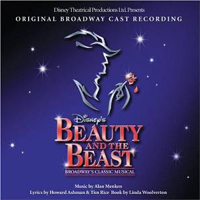 Original Broadway Cast, 1994 (Walt Disney Records)
Original Broadway Cast, 1994 (Walt Disney Records)  (4 / 5) This Broadway cast recording demonstrates how a solid stage score for Beauty and the Beast was created by adding terrific new songs to the film version’s song stack, and it also serves as a document of several fine performances. Susan Egan is a strong-voiced Belle, Terrence Mann an excellent Beast, and Burke Moses the definitive Gaston. Giving fine support are Tom Bosley as Belle’s father in the new song “No Matter What”; Gary Beach, who performs Lumière’s “Be Our Guest” and his part of “Human Again” with great éclat; and Beth Fowler, using her ravishing tones to burnish the title tune. Barbara Marineau as Madame de la Grande Bouche. Stacey Logan as Babette, and Kenny Raskin as Lefou round out the laudable cast. Alan Menken and Tim Rice were perceptive about how to give the film score the additional depth it needed to support a full-length stage musical, and the cast album, like the film soundtrack, boasts orchestrations by Danny Troob. It is now difficult to conceive of Beauty and the Beast without Belle’s “Home,” the Beast’s “If I Can’t Love Her,” and Gaston’s “Me.” This “tale as old as time” is destined for a long life on the world’s stages and on recordings as it introduces youngsters all over the world to the joy of musicals. — J.D.
(4 / 5) This Broadway cast recording demonstrates how a solid stage score for Beauty and the Beast was created by adding terrific new songs to the film version’s song stack, and it also serves as a document of several fine performances. Susan Egan is a strong-voiced Belle, Terrence Mann an excellent Beast, and Burke Moses the definitive Gaston. Giving fine support are Tom Bosley as Belle’s father in the new song “No Matter What”; Gary Beach, who performs Lumière’s “Be Our Guest” and his part of “Human Again” with great éclat; and Beth Fowler, using her ravishing tones to burnish the title tune. Barbara Marineau as Madame de la Grande Bouche. Stacey Logan as Babette, and Kenny Raskin as Lefou round out the laudable cast. Alan Menken and Tim Rice were perceptive about how to give the film score the additional depth it needed to support a full-length stage musical, and the cast album, like the film soundtrack, boasts orchestrations by Danny Troob. It is now difficult to conceive of Beauty and the Beast without Belle’s “Home,” the Beast’s “If I Can’t Love Her,” and Gaston’s “Me.” This “tale as old as time” is destined for a long life on the world’s stages and on recordings as it introduces youngsters all over the world to the joy of musicals. — J.D.
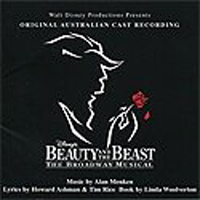 Original Australian Cast, 1995 (Walt Disney Records)
Original Australian Cast, 1995 (Walt Disney Records)  (3 / 5) Hugh Jackman played Gaston in the first Australian company of Beauty and the Beast, making this cast album worthy of attention if only for that reason, but the recording as a whole has great energy. Rachael Peck as Belle is strong in the opening ensemble number, saucy and audibly amused by Gaston in “Me,” and her alternately sweet and powerful voice really opens up in “Home.” As the Beast, baritone Michael Cormick is heart-wrenching in “How Long Can This Go On?” and “If I Can’t Love Her.” Jackman’s delivery of “Me” makes this comic gem his own. In “Gaston,” he is exultant and genuinely funny, assisted by Zachary McKay’s zany Lefou; in later numbers, when his character turns from amusing to evil, Jackman delivers totally. Robyn Arthur is not in great voice for the title song, but her rendition is nevertheless compelling. The rest of the supporting cast is solid without being distinctive. — J.D.
(3 / 5) Hugh Jackman played Gaston in the first Australian company of Beauty and the Beast, making this cast album worthy of attention if only for that reason, but the recording as a whole has great energy. Rachael Peck as Belle is strong in the opening ensemble number, saucy and audibly amused by Gaston in “Me,” and her alternately sweet and powerful voice really opens up in “Home.” As the Beast, baritone Michael Cormick is heart-wrenching in “How Long Can This Go On?” and “If I Can’t Love Her.” Jackman’s delivery of “Me” makes this comic gem his own. In “Gaston,” he is exultant and genuinely funny, assisted by Zachary McKay’s zany Lefou; in later numbers, when his character turns from amusing to evil, Jackman delivers totally. Robyn Arthur is not in great voice for the title song, but her rendition is nevertheless compelling. The rest of the supporting cast is solid without being distinctive. — J.D.
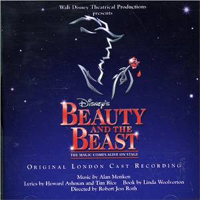 Original London Cast, 1997 (Walt Disney Records)
Original London Cast, 1997 (Walt Disney Records)  (2 / 5) Save for a small cut in “Home,” the content of this album is virtually the same as the Broadway recording (both were produced by Bruce Bornick and Alan Menken). But the overall performance differs in style; it has a gentler quality, and lacks a certain magic. Julie-Alanah Brighten is a very proper Belle with little spunk or fire. Alasdair Harvey is a well-mannered, sweet-voiced Beast; he misses the surface gruffness that’s needed for the role, though he’s moving in the reprise of”If I Can’t Love Her.” Burke Moses again plays Gaston, and he lifts the proceedings with “Me” and “Gaston,” supported in the latter by Richard Gauntlett’s cockney Lefou. Mary Millar is delightful as Mrs. Potts, finding some interesting nuances in the title song. The opening narration by Barry James, who plays Cogsworth, sets the subdued tone for this pleasant if unexceptional recording. — J.D.
(2 / 5) Save for a small cut in “Home,” the content of this album is virtually the same as the Broadway recording (both were produced by Bruce Bornick and Alan Menken). But the overall performance differs in style; it has a gentler quality, and lacks a certain magic. Julie-Alanah Brighten is a very proper Belle with little spunk or fire. Alasdair Harvey is a well-mannered, sweet-voiced Beast; he misses the surface gruffness that’s needed for the role, though he’s moving in the reprise of”If I Can’t Love Her.” Burke Moses again plays Gaston, and he lifts the proceedings with “Me” and “Gaston,” supported in the latter by Richard Gauntlett’s cockney Lefou. Mary Millar is delightful as Mrs. Potts, finding some interesting nuances in the title song. The opening narration by Barry James, who plays Cogsworth, sets the subdued tone for this pleasant if unexceptional recording. — J.D.
 Film Soundtrack, 2017 (Walt Disney Records) No stars; not recommended. This is the soundtrack album of a live-action remake of the animated Disney film of the same title. Since it was not conceived as a big-screen transfer of the stage musical Beauty and the Beast, none of the songs that Alan Menken and Tim Rice wrote for the Broadway show as additions to the original Menken/Ashman score for the animated film were retained; instead, Menken and Rice were enlisted to write another set of new songs. Fans of the stage show will be dissatisfied that “If I Can’t Love Her” (Menken/Rice) and “Human Again” (Menken/Ashman) have been replaced by the inferior “Evermore” and “Days in the Sun,” respectively, and even audiences who are unfamiliar with previous versions of the property may find that these items seem out of place. Though the movie has star power, this is the least vocally impressive of any Beauty and the Beast recording to date. Emma Watson’s singing is colorless and wispy in the role of Belle. She’s paired with the unimpressive Beast of Dan Stevens, both of them sounding heavily autotuned. Emma Thompson, Ewan McGregor, and Luke Evans are fine as Mrs. Potts, Lumière, and Gaston, but none of their performances compare favorably with those of the Broadway or original film casts. Only Audra McDonald as “Madame Garderobe” displays any musical theater prowess, and she’s criminally underused. As for the songs carried over from the 1991 Menken-Ashman score, they suffer greatly here due to a lack of vocal power (“Something There”), fussy orchestrations and arrangements (“Belle”), and/or misguided edits (“Gaston”). The huge commercial success of this film has inspired Disney to continue the live-action-remake trend. Whether this will eventually produce artistically compelling results remains to be seen. — Matt Koplik
Film Soundtrack, 2017 (Walt Disney Records) No stars; not recommended. This is the soundtrack album of a live-action remake of the animated Disney film of the same title. Since it was not conceived as a big-screen transfer of the stage musical Beauty and the Beast, none of the songs that Alan Menken and Tim Rice wrote for the Broadway show as additions to the original Menken/Ashman score for the animated film were retained; instead, Menken and Rice were enlisted to write another set of new songs. Fans of the stage show will be dissatisfied that “If I Can’t Love Her” (Menken/Rice) and “Human Again” (Menken/Ashman) have been replaced by the inferior “Evermore” and “Days in the Sun,” respectively, and even audiences who are unfamiliar with previous versions of the property may find that these items seem out of place. Though the movie has star power, this is the least vocally impressive of any Beauty and the Beast recording to date. Emma Watson’s singing is colorless and wispy in the role of Belle. She’s paired with the unimpressive Beast of Dan Stevens, both of them sounding heavily autotuned. Emma Thompson, Ewan McGregor, and Luke Evans are fine as Mrs. Potts, Lumière, and Gaston, but none of their performances compare favorably with those of the Broadway or original film casts. Only Audra McDonald as “Madame Garderobe” displays any musical theater prowess, and she’s criminally underused. As for the songs carried over from the 1991 Menken-Ashman score, they suffer greatly here due to a lack of vocal power (“Something There”), fussy orchestrations and arrangements (“Belle”), and/or misguided edits (“Gaston”). The huge commercial success of this film has inspired Disney to continue the live-action-remake trend. Whether this will eventually produce artistically compelling results remains to be seen. — Matt Koplik
Bar Mitzvah Boy
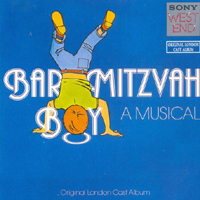 Original London Cast, 1978 (Columbia/Sony)
Original London Cast, 1978 (Columbia/Sony)  (3 / 5) The notes for the CD edition of this recording quote an ad from the theater program, predicting that “the show will be onstage a long time — the album will be on your turntable even longer.” But Bar Mitzvah Boy closed quickly in London. Jack Rosenthal based his book for the musical on his successful British teleplay about a London family planning a bar mitzvah; the title character, Eliot Green, disappears in the midst of the service. This little-known, under-appreciated show has music by Jule Styne and lyrics by Don Black. With Styne returning to his roots (he was Jewish and born in London), the score is one of the better efforts of his late career. Highlights include Eliot’s initial discussion with his rabbi about the meaning of a bar mitzvah, “Why?” / “If Only a Little Bit Sticks”; “The Bar Mitzvah of Eliot Green,” which deals with the tumult of preparing for the event; the parents’ love song, “We’ve Done All Right”; Eliot’s sister’s ballad of reassurance, “You Wouldn’t Be You”; and “Rita’s Request,” a hilarious number for the mother. The score has a unique, Judeo/British, 1970s sound. It’s solid, impressive work even if it’s not in the same league as Styne’s Gypsy or Funny Girl. Directed by Martin Charnin, the strong cast includes many West End theater veterans. The hard-to-find recording is filled with nuggets of pleasure, and Eliot’s final, conciliatory song, “I’ve Just Begun,” is guaranteed to warm the heart of even the most jaded listener. — Jeffrey Dunn
(3 / 5) The notes for the CD edition of this recording quote an ad from the theater program, predicting that “the show will be onstage a long time — the album will be on your turntable even longer.” But Bar Mitzvah Boy closed quickly in London. Jack Rosenthal based his book for the musical on his successful British teleplay about a London family planning a bar mitzvah; the title character, Eliot Green, disappears in the midst of the service. This little-known, under-appreciated show has music by Jule Styne and lyrics by Don Black. With Styne returning to his roots (he was Jewish and born in London), the score is one of the better efforts of his late career. Highlights include Eliot’s initial discussion with his rabbi about the meaning of a bar mitzvah, “Why?” / “If Only a Little Bit Sticks”; “The Bar Mitzvah of Eliot Green,” which deals with the tumult of preparing for the event; the parents’ love song, “We’ve Done All Right”; Eliot’s sister’s ballad of reassurance, “You Wouldn’t Be You”; and “Rita’s Request,” a hilarious number for the mother. The score has a unique, Judeo/British, 1970s sound. It’s solid, impressive work even if it’s not in the same league as Styne’s Gypsy or Funny Girl. Directed by Martin Charnin, the strong cast includes many West End theater veterans. The hard-to-find recording is filled with nuggets of pleasure, and Eliot’s final, conciliatory song, “I’ve Just Begun,” is guaranteed to warm the heart of even the most jaded listener. — Jeffrey Dunn
Bat Boy
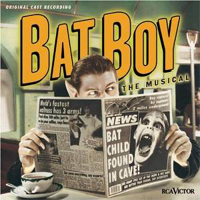 Original Off-Broadway Cast, 2001 (RCA)
Original Off-Broadway Cast, 2001 (RCA)  (2 / 5) Ever since Little Shop of Horrors, Off-Broadway has spawned lots of campy musical sci-fi spoofs. Bat Boy is one of the better ones, though that’s not saying much. The book, by Keythe Farley and Brian Flemming, about the discovery of an alleged “bat child” is a convoluted tale of small-town viciousness, family secrets, and incest, all played for marginal laughs. Still, the wildly uneven score by newcomer Laurence O’Keefe is worth your attention. Interestingly, the most ambitious passages are the most successful. The comic”Show You a Thing or Two”is a mini-masterpiece in which the bat boy, renamed Edgar, is transformed into an Anglophile whiz kid; anyone who can work Ruby Ridge, Cole Porter, and The Remains of the Day into a lyric is OK by me. Also nifty is the first-act closer, “Comfort and Joy,” which advances the plot with speed and wit. And the ballad “Let Me Walk Among You” weds a touching melody to hilariously deadpan lyrics. So how can O’Keefe have also written junky numbers like “Another Dead Cow,” in which the townspeople wonder who killed their livestock, or the tasteless “Children, Children,” an inter-species sex orgy? Similarly, the orchestrations by O’Keefe and Alex Lacamoire range from clever to crass. In the title role, Deven May has a powerful voice and a light comic touch. There’s also skillful work from Kaitlin Hopkins as Edgar’s adoptive mother — her “Three-Bedroom House” brings down the house — and from Kerry Butler as his innocent love interest. Steel yourself for the worst of the score and prepare to enjoy the best. — David Barbour
(2 / 5) Ever since Little Shop of Horrors, Off-Broadway has spawned lots of campy musical sci-fi spoofs. Bat Boy is one of the better ones, though that’s not saying much. The book, by Keythe Farley and Brian Flemming, about the discovery of an alleged “bat child” is a convoluted tale of small-town viciousness, family secrets, and incest, all played for marginal laughs. Still, the wildly uneven score by newcomer Laurence O’Keefe is worth your attention. Interestingly, the most ambitious passages are the most successful. The comic”Show You a Thing or Two”is a mini-masterpiece in which the bat boy, renamed Edgar, is transformed into an Anglophile whiz kid; anyone who can work Ruby Ridge, Cole Porter, and The Remains of the Day into a lyric is OK by me. Also nifty is the first-act closer, “Comfort and Joy,” which advances the plot with speed and wit. And the ballad “Let Me Walk Among You” weds a touching melody to hilariously deadpan lyrics. So how can O’Keefe have also written junky numbers like “Another Dead Cow,” in which the townspeople wonder who killed their livestock, or the tasteless “Children, Children,” an inter-species sex orgy? Similarly, the orchestrations by O’Keefe and Alex Lacamoire range from clever to crass. In the title role, Deven May has a powerful voice and a light comic touch. There’s also skillful work from Kaitlin Hopkins as Edgar’s adoptive mother — her “Three-Bedroom House” brings down the house — and from Kerry Butler as his innocent love interest. Steel yourself for the worst of the score and prepare to enjoy the best. — David Barbour
Barnum
 Original Broadway Cast, 1980 (Columbia/Sony)
Original Broadway Cast, 1980 (Columbia/Sony)  (2 / 5) This Jim Dale vehicle has a book by Mark Bramble, music by Cy Coleman, and lyrics by Michael Stewart. A fictionalized biography of the showman P.T. Barnum, it’s really a series of production numbers looking for a musical. There is a sort-of plot about Barnum’s up-and-down marriage to the disapproving Charity (a young, chipper Glenn Close), but the real drawing cards were Joe Layton’s inventive staging, Dale’s inexhaustible energy, and the manically cheerful score. Coleman and Stewart’s work is thoroughly professional, especially the witty “There Is a Sucker Born Every Minute” and the catchy “Thank God I’m Old” (sung by Terri White as one of Barnum’s attractions, allegedly the oldest woman in the world). And just try to get the Act II opening march “Come Follow the Band” out of your head. But the score could use a dose of Ritalin; even the ballads are extroverted, and Hershy Kay’s orchestrations add to the forced cheerfulness. — David Barbour
(2 / 5) This Jim Dale vehicle has a book by Mark Bramble, music by Cy Coleman, and lyrics by Michael Stewart. A fictionalized biography of the showman P.T. Barnum, it’s really a series of production numbers looking for a musical. There is a sort-of plot about Barnum’s up-and-down marriage to the disapproving Charity (a young, chipper Glenn Close), but the real drawing cards were Joe Layton’s inventive staging, Dale’s inexhaustible energy, and the manically cheerful score. Coleman and Stewart’s work is thoroughly professional, especially the witty “There Is a Sucker Born Every Minute” and the catchy “Thank God I’m Old” (sung by Terri White as one of Barnum’s attractions, allegedly the oldest woman in the world). And just try to get the Act II opening march “Come Follow the Band” out of your head. But the score could use a dose of Ritalin; even the ballads are extroverted, and Hershy Kay’s orchestrations add to the forced cheerfulness. — David Barbour
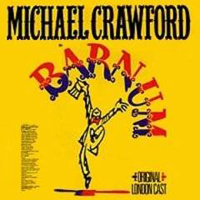 London Cast, 1981 (Chrysalis/no CD)
London Cast, 1981 (Chrysalis/no CD)  (1 / 5) Michael Crawford had one of his biggest pre-Phantom triumphs in the title role, but this recording of the London Barnum pales next to the Broadway original. Crawford’s performance was touted as having topped Jim Dale’s in terms of physical stunts — a video of this production was made, and is still available commercially — but on the cast album, his more relaxed interpretation lacks pizzazz. If he generally sings better than Dale, the energy of the role’s creator is much missed. Deborah Grant’s Charity is a colorless and vocally uninteresting presence; even Glenn Close naysayers are likely to prefer Close’s singing. The best work here comes from Jennie McGustle, whose zesty rendition of “Thank God I’m Old” is almost worthy of Terri White. As Jenny Lind, Sarah Payne sports an accent as thick as a slice of sacher torte, turning the first-act ballad “Love Makes Fools of Us All” into a mush of vowel sounds. Also missing are the brief musical “chases” between various sections of the show. There are hints of a different approach in a revised opening, which begins with a rather ghostly pipe organ, and a slightly different song order that places Tom Thumb’s solo, “Bigger Isn’t Better,” in the second act. The orchestrations sound altered a bit, with a country fiddle appearing prominently in “Museum Song” and “I Like Your Style.” But overall, next to the original, this disc is so much humbug. — D.B.
(1 / 5) Michael Crawford had one of his biggest pre-Phantom triumphs in the title role, but this recording of the London Barnum pales next to the Broadway original. Crawford’s performance was touted as having topped Jim Dale’s in terms of physical stunts — a video of this production was made, and is still available commercially — but on the cast album, his more relaxed interpretation lacks pizzazz. If he generally sings better than Dale, the energy of the role’s creator is much missed. Deborah Grant’s Charity is a colorless and vocally uninteresting presence; even Glenn Close naysayers are likely to prefer Close’s singing. The best work here comes from Jennie McGustle, whose zesty rendition of “Thank God I’m Old” is almost worthy of Terri White. As Jenny Lind, Sarah Payne sports an accent as thick as a slice of sacher torte, turning the first-act ballad “Love Makes Fools of Us All” into a mush of vowel sounds. Also missing are the brief musical “chases” between various sections of the show. There are hints of a different approach in a revised opening, which begins with a rather ghostly pipe organ, and a slightly different song order that places Tom Thumb’s solo, “Bigger Isn’t Better,” in the second act. The orchestrations sound altered a bit, with a country fiddle appearing prominently in “Museum Song” and “I Like Your Style.” But overall, next to the original, this disc is so much humbug. — D.B.
The Band Wagon
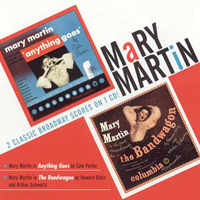 Studio Cast, 1950 (Columbia/Sony)
Studio Cast, 1950 (Columbia/Sony)  (1 / 5) One of the great 1930s Broadway revues, The Band Wagon (1931) was graced with a terrific Arthur Schwartz-Howard Dietz score, including “Dancing in the Dark” and “I Love Louisa,” and a fine cast. It contained too good a collection of songs to pass away when something as temporal as a revue had closed. There was a mangled, sort-of-musical film version in 1949, titled Dancing in the Dark — and then, of course, the 1953 Fred Astaire-Cyd Charisse classic. (See below.) Coming between them, at the dawn of the LP era, was a recording by Mary Martin. This can in no way be termed a re-creation of the original score; instead, it offers a big star singing the show’s best numbers, packaged with Martin’s recordings of several songs from Cole Porter’s Anything Goes to fill out the album. The star is in great voice, but don’t expect any probing vocal drama here — or, indeed, anything other than perfunctory commitment. This is simply a group of fine songs performed in a resoundingly professional manner but with no theatrical flavor. — Richard Barrios
(1 / 5) One of the great 1930s Broadway revues, The Band Wagon (1931) was graced with a terrific Arthur Schwartz-Howard Dietz score, including “Dancing in the Dark” and “I Love Louisa,” and a fine cast. It contained too good a collection of songs to pass away when something as temporal as a revue had closed. There was a mangled, sort-of-musical film version in 1949, titled Dancing in the Dark — and then, of course, the 1953 Fred Astaire-Cyd Charisse classic. (See below.) Coming between them, at the dawn of the LP era, was a recording by Mary Martin. This can in no way be termed a re-creation of the original score; instead, it offers a big star singing the show’s best numbers, packaged with Martin’s recordings of several songs from Cole Porter’s Anything Goes to fill out the album. The star is in great voice, but don’t expect any probing vocal drama here — or, indeed, anything other than perfunctory commitment. This is simply a group of fine songs performed in a resoundingly professional manner but with no theatrical flavor. — Richard Barrios
 Film Soundtrack, 1953 (MGM/Rhino-Turner)
Film Soundtrack, 1953 (MGM/Rhino-Turner)  (4 / 5) Fans of this film may not be aware that Fred Astaire starred in The Band Wagon on Broadway in 1931 as well. The movie adds Schwartz-Dietz songs from other shows, and a new gem written for the movie, the evergreen showbiz hymn “That’s Entertainment!” The plot has little or nothing to do with The Band Wagon as it existed on stage, but Astaire is in fine company here: Jack Buchanan, Oscar Levant, and the effervescent Nanette Fabray in her only good film role. Cyd Charisse, one of Astaire’s finest dance partners, is dubbed by India Adams — a good singer, but this is not the best of such match-ups. Two outtake recordings of songs cut from the film are special treats: Fabray’s “Got a Bran’ New Suit,” originally from the Schwartz & Dietz revue At Home Abroad, and Adams’ rendition of “Two-Faced Woman.” (The latter recording was later used in the film Torch Song, with Joan Crawford — in blackface! — lip-synching to Adams’ vocal.) Although this soundtrack CD is obviously not a memento of the show as performed on Broadway, it’s crammed with musical pleasures. — R.B.
(4 / 5) Fans of this film may not be aware that Fred Astaire starred in The Band Wagon on Broadway in 1931 as well. The movie adds Schwartz-Dietz songs from other shows, and a new gem written for the movie, the evergreen showbiz hymn “That’s Entertainment!” The plot has little or nothing to do with The Band Wagon as it existed on stage, but Astaire is in fine company here: Jack Buchanan, Oscar Levant, and the effervescent Nanette Fabray in her only good film role. Cyd Charisse, one of Astaire’s finest dance partners, is dubbed by India Adams — a good singer, but this is not the best of such match-ups. Two outtake recordings of songs cut from the film are special treats: Fabray’s “Got a Bran’ New Suit,” originally from the Schwartz & Dietz revue At Home Abroad, and Adams’ rendition of “Two-Faced Woman.” (The latter recording was later used in the film Torch Song, with Joan Crawford — in blackface! — lip-synching to Adams’ vocal.) Although this soundtrack CD is obviously not a memento of the show as performed on Broadway, it’s crammed with musical pleasures. — R.B.
Ballroom
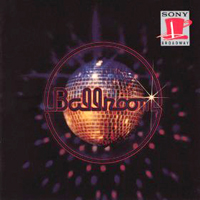 Original Broadway Cast, 1978 (Columbia/Sony)
Original Broadway Cast, 1978 (Columbia/Sony)  (1 / 5) Michael Bennett’s big post-Chorus Line flop is beloved by those who saw it, but sadly, the show’s special qualities are not retained on an audio-only disc. Jerome Kass’s libretto is based on his script for the television film Queen of the Stardust Ballroom. Dorothy Loudon stars as Bea, a lonely Bronx widow who finds glamour and romance at the local dance palace. Fans remember Loudon’s performance and Bennett’s magical staging, but the score by Billy Goldenberg and Alan and Marilyn Bergman contains only a handful of book numbers; everything else consists of dance sequences featuring faux-pop hits covered by the ballroom’s house singers. These tunes are very pleasant in a Steve-and-Eydie kind of way, especially in Jonathan Tunick’s orchestrations, but they don’t convey a sense of the show’s story. Given a chance, Loudon scores big — especially with her nervy, volatile delivery of the scorching 11 o’clock number “Fifty Percent,” in which Bea chooses to accept the love of a married man (played by Vincent Gardenia). Overall, the recording is a disappointment, but if you want to understand what made Loudon one of the most distinct theatrical personalities of all time, it’s worth a listen — David Barbour
(1 / 5) Michael Bennett’s big post-Chorus Line flop is beloved by those who saw it, but sadly, the show’s special qualities are not retained on an audio-only disc. Jerome Kass’s libretto is based on his script for the television film Queen of the Stardust Ballroom. Dorothy Loudon stars as Bea, a lonely Bronx widow who finds glamour and romance at the local dance palace. Fans remember Loudon’s performance and Bennett’s magical staging, but the score by Billy Goldenberg and Alan and Marilyn Bergman contains only a handful of book numbers; everything else consists of dance sequences featuring faux-pop hits covered by the ballroom’s house singers. These tunes are very pleasant in a Steve-and-Eydie kind of way, especially in Jonathan Tunick’s orchestrations, but they don’t convey a sense of the show’s story. Given a chance, Loudon scores big — especially with her nervy, volatile delivery of the scorching 11 o’clock number “Fifty Percent,” in which Bea chooses to accept the love of a married man (played by Vincent Gardenia). Overall, the recording is a disappointment, but if you want to understand what made Loudon one of the most distinct theatrical personalities of all time, it’s worth a listen — David Barbour
The Baker’s Wife
 Original Cast, 1976 (Take Home Tunes)
Original Cast, 1976 (Take Home Tunes)  (5 / 5) This beautiful cast album continues to mystify listeners as to why The Baker’s Wife was a huge flop. Based on the play and subsequent film La femme du boulanger by Marcel Pagnol and Jean Giono, the musical has a book by Joseph Stein, with music and lyrics by Stephen Schwartz. Set in long-ago provincial France, the fable-like story revolves around a middle-aged baker’s young wife who leaves him for a torrid affair with a handsome, young villager. The show closed on the road to Broadway, and most of the cast and creative-team members were replaced during its lengthy tryout tour. When it finally shuttered in Washington, the leads were Paul Sorvino, whose semi-operatic voice sounds great in the role of Aimable, the baker, on this abridged recording of the score; Patti LuPone as his wife, Genevieve, belting to high heaven when she has to, but wonderfully warm in the more lyrical songs; Kurt Peterson, appropriately sexy as her young lover, Dominique; and the silvery-voiced Teri Ralston as Denise, a village woman who gets to sing the lilting “Chanson.” All 10 selections on the album are superb, from character-establishing numbers such as “Merci, Madame” to ravishing ballads including “Gifts of Love,” a gorgeous and poignant piece in which Genevieve resigns herself to a marriage that’s based on companionship rather than passion. The most famous item from the score, and deservedly so, is “Meadowlark,” the magnificent story-song that the baker’s wife belts out when deciding to go off with her young stud; another well-known highlight is “Proud Lady,” sung by the strutting peacock Dominique. Schwartz’s score differs impressively from the more pop/rock style of his monster hits Godspell and Pippin, and the recording boasts lovely orchestrations. — Michael Portantiere
(5 / 5) This beautiful cast album continues to mystify listeners as to why The Baker’s Wife was a huge flop. Based on the play and subsequent film La femme du boulanger by Marcel Pagnol and Jean Giono, the musical has a book by Joseph Stein, with music and lyrics by Stephen Schwartz. Set in long-ago provincial France, the fable-like story revolves around a middle-aged baker’s young wife who leaves him for a torrid affair with a handsome, young villager. The show closed on the road to Broadway, and most of the cast and creative-team members were replaced during its lengthy tryout tour. When it finally shuttered in Washington, the leads were Paul Sorvino, whose semi-operatic voice sounds great in the role of Aimable, the baker, on this abridged recording of the score; Patti LuPone as his wife, Genevieve, belting to high heaven when she has to, but wonderfully warm in the more lyrical songs; Kurt Peterson, appropriately sexy as her young lover, Dominique; and the silvery-voiced Teri Ralston as Denise, a village woman who gets to sing the lilting “Chanson.” All 10 selections on the album are superb, from character-establishing numbers such as “Merci, Madame” to ravishing ballads including “Gifts of Love,” a gorgeous and poignant piece in which Genevieve resigns herself to a marriage that’s based on companionship rather than passion. The most famous item from the score, and deservedly so, is “Meadowlark,” the magnificent story-song that the baker’s wife belts out when deciding to go off with her young stud; another well-known highlight is “Proud Lady,” sung by the strutting peacock Dominique. Schwartz’s score differs impressively from the more pop/rock style of his monster hits Godspell and Pippin, and the recording boasts lovely orchestrations. — Michael Portantiere
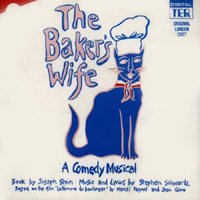 Original London Cast, 1990 (JAY, 2CDs)
Original London Cast, 1990 (JAY, 2CDs)  (1 / 5) Even as musical theater completists appreciate the fact that a high-profile London production of The Baker’s Wife yielded this much lengthier recording of the score, it must be said that the results are unpersuasive in terms of both text and performance. Directed by Trevor Nunn, this version has some new Stephen Schwartz songs, along with several that were in the original production but not previously recorded. Still, the two-CD album is disconcerting. First of all, as presented here, the songs carried over from the earlier recording have many unfamiliar lyrics; Schwartz has a penchant for tinkering with his own work after the fact, but it’s hard to understand the point of such revisions when the new lyrics don’t represent an improvement over the originals. In “Chanson,” for example, we now hear lyrics about gulls crying rather than sheep bleating. Was this change necessary? Severely truncated as the original recording is, it’s sad to report that the new/old songs included on the JAY recording aren’t very interesting. Many of them involve the villagers gossiping about the Aimable-Genevieve-Dominique affair (although, here, the young man’s name is spelled “Dominic”). As for the leading players: Alun Armstrong’s fine acting can’t compensate for his substandard singing voice, plus he sings the baker’s songs in much lower keys than Paul Sorvino’s, with dispiriting results. The plum role of Genevieve is filled by Shar Lee Hill, who is…no Patti LuPone. As Dominic, Drue Williams sings poorly and sounds effeminate, which certainly doesn’t work for this character. Jill Martin displays the best voice of all the London principals in Denise’s “Chanson,” but here again, the song is performed in a considerably lower key than on the American cast album, and is therefore far less effective. — M.P.
(1 / 5) Even as musical theater completists appreciate the fact that a high-profile London production of The Baker’s Wife yielded this much lengthier recording of the score, it must be said that the results are unpersuasive in terms of both text and performance. Directed by Trevor Nunn, this version has some new Stephen Schwartz songs, along with several that were in the original production but not previously recorded. Still, the two-CD album is disconcerting. First of all, as presented here, the songs carried over from the earlier recording have many unfamiliar lyrics; Schwartz has a penchant for tinkering with his own work after the fact, but it’s hard to understand the point of such revisions when the new lyrics don’t represent an improvement over the originals. In “Chanson,” for example, we now hear lyrics about gulls crying rather than sheep bleating. Was this change necessary? Severely truncated as the original recording is, it’s sad to report that the new/old songs included on the JAY recording aren’t very interesting. Many of them involve the villagers gossiping about the Aimable-Genevieve-Dominique affair (although, here, the young man’s name is spelled “Dominic”). As for the leading players: Alun Armstrong’s fine acting can’t compensate for his substandard singing voice, plus he sings the baker’s songs in much lower keys than Paul Sorvino’s, with dispiriting results. The plum role of Genevieve is filled by Shar Lee Hill, who is…no Patti LuPone. As Dominic, Drue Williams sings poorly and sounds effeminate, which certainly doesn’t work for this character. Jill Martin displays the best voice of all the London principals in Denise’s “Chanson,” but here again, the song is performed in a considerably lower key than on the American cast album, and is therefore far less effective. — M.P.
Baker Street
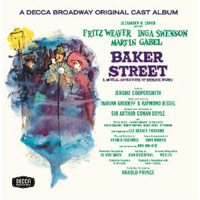 Original Broadway Cast, 1965 (MGM/Decca)
Original Broadway Cast, 1965 (MGM/Decca)  (2 / 5) One of the last in the cycle of My Fair Lady wannabes, Baker Street is complete with handsome Victorian settings, a misogynistic hero (Sherlock Holmes), and a Cockney chorus high-kicking all over London. The problem was that songwriters Marian Grudeff and Raymond Jessel emphatically were not Lerner and Loewe, not even with Bock and Harnick ghostwriting three numbers (”I’m in London Again,” “Cold Clear World,” and “I Shall Miss You”) during the troubled tryout period. The melodic lines are facile, the lyrics occasionally intricate — as in the ironically named “It’s So Simple” — yet it’s all on the surface. As Holmes, Fritz Weaver is fine, but he can’t make anything memorable of the material. His leading lady, Inga Swenson, by all accounts impressive onstage, doesn’t come across on this recording. Even the old-fashioned, three-part, would-be showstopper “Letters” lands with a thud. Martin Gabel as Moriarty, Peter Sallis as Watson, and Teddy Green as a leading Baker Street Irregular round out the cast; they all work hard, but in vain. Although the album is well designed, with color photos and a verbose synopsis, it never convinces you that this was “the hottest musical of 1965.” It’s worth noting that an even shorter-lived show from that year, Drat! The Cat!, had one throwaway number in it (“Holmes and Watson”) that encapsulated what was special about the duo better than this entire score. — Marc Miller
(2 / 5) One of the last in the cycle of My Fair Lady wannabes, Baker Street is complete with handsome Victorian settings, a misogynistic hero (Sherlock Holmes), and a Cockney chorus high-kicking all over London. The problem was that songwriters Marian Grudeff and Raymond Jessel emphatically were not Lerner and Loewe, not even with Bock and Harnick ghostwriting three numbers (”I’m in London Again,” “Cold Clear World,” and “I Shall Miss You”) during the troubled tryout period. The melodic lines are facile, the lyrics occasionally intricate — as in the ironically named “It’s So Simple” — yet it’s all on the surface. As Holmes, Fritz Weaver is fine, but he can’t make anything memorable of the material. His leading lady, Inga Swenson, by all accounts impressive onstage, doesn’t come across on this recording. Even the old-fashioned, three-part, would-be showstopper “Letters” lands with a thud. Martin Gabel as Moriarty, Peter Sallis as Watson, and Teddy Green as a leading Baker Street Irregular round out the cast; they all work hard, but in vain. Although the album is well designed, with color photos and a verbose synopsis, it never convinces you that this was “the hottest musical of 1965.” It’s worth noting that an even shorter-lived show from that year, Drat! The Cat!, had one throwaway number in it (“Holmes and Watson”) that encapsulated what was special about the duo better than this entire score. — Marc Miller
Bajour
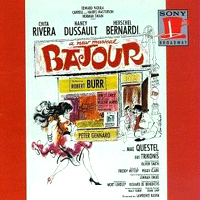 Original Broadway Cast, 1964 (Columbia/Sony) No stars; not recommended. Some ethnic groups have all the luck — and some don’t. The same year that Fiddler on the Roof so beautifully celebrated the joys and sorrows of Jewish life, Bajour featured Nancy Dussault as an NYU anthropology major who latches onto a tribe of gypsies led by Herschel Bernardi. Top-billed Chita Rivera plays the daughter of a rival tribe, doing her trademark spitfire thing and belting out cheesy numbers like “Mean.” Ernest Kincy’s libretto and Walter Marks’ score (astonishingly, inspired by New Yorker stories by Joseph Mitchell) are a mishmash of gypsy intrigue that’s enough to induce a heart attack in the politically correct. The recording starts off with a dynamic overture orchestrated by Mort Lindsey and Dussault’s amusing “Where Is the Tribe for Me?” But too often, Bajour is merely desperate and loud. The second-act show-stopper, “Honest Man,” with Bernardi and rival gypsy king Herbert Edelman trying to con each other, is pretty embarrassing. Give it one star if you’re a Chita fan. — David Barbour
Original Broadway Cast, 1964 (Columbia/Sony) No stars; not recommended. Some ethnic groups have all the luck — and some don’t. The same year that Fiddler on the Roof so beautifully celebrated the joys and sorrows of Jewish life, Bajour featured Nancy Dussault as an NYU anthropology major who latches onto a tribe of gypsies led by Herschel Bernardi. Top-billed Chita Rivera plays the daughter of a rival tribe, doing her trademark spitfire thing and belting out cheesy numbers like “Mean.” Ernest Kincy’s libretto and Walter Marks’ score (astonishingly, inspired by New Yorker stories by Joseph Mitchell) are a mishmash of gypsy intrigue that’s enough to induce a heart attack in the politically correct. The recording starts off with a dynamic overture orchestrated by Mort Lindsey and Dussault’s amusing “Where Is the Tribe for Me?” But too often, Bajour is merely desperate and loud. The second-act show-stopper, “Honest Man,” with Bernardi and rival gypsy king Herbert Edelman trying to con each other, is pretty embarrassing. Give it one star if you’re a Chita fan. — David Barbour
Baby
 Original Broadway Cast, 1983 (Polydor/]AY)
Original Broadway Cast, 1983 (Polydor/]AY)  (5 / 5) The too-busy opening sequence is a bumpy ride, with some smarmy humor about the conception of a child. Then Liz Callaway sings to Todd Graff, “Picture a flailing spermatozoan / Not even knowin’ where he is goin”‘ — and the sun breaks out, never to leave. The David Shire-Richard Maltby, Jr. score is easily one of the best of the decade, thoroughly contemporary yet melodic and as clever and hilarious as it is heartfelt. When Callaway lets loose with the soaring “The Story Goes On” or when Graff offers the beautiful ballad “I Chose Right,” you could weep at the bad career luck of Maltby and Shire. Other highlights: the strong women’s trio”I Want It All,” the joyous “Fatherhood Blues,” James Congdon’s funny-sad “Easier to Love,” and Beth Fowler’s “Patterns.” (The last-named song was cut from the Broadway production but is generously included here.) Martin Vidnovic and Catherine Cox are wonderful as an infertile yuppie couple, and a belting Kim Criswell figures prominently in the chorus (she’s the mom lamenting the pain of childbirth in “The Ladies Singing Their Song”). Jonathan Tunick’s orchestrations make a great score sound even better, as does Peter Howard’s conducting. Although this musical couldn’t find an audience in its Broadway mounting, it has done well in community and regional theaters. Thanks to Polydor for having given the score such a full recording; just zip past the first two minutes or so, and bliss out. — Marc Miller
(5 / 5) The too-busy opening sequence is a bumpy ride, with some smarmy humor about the conception of a child. Then Liz Callaway sings to Todd Graff, “Picture a flailing spermatozoan / Not even knowin’ where he is goin”‘ — and the sun breaks out, never to leave. The David Shire-Richard Maltby, Jr. score is easily one of the best of the decade, thoroughly contemporary yet melodic and as clever and hilarious as it is heartfelt. When Callaway lets loose with the soaring “The Story Goes On” or when Graff offers the beautiful ballad “I Chose Right,” you could weep at the bad career luck of Maltby and Shire. Other highlights: the strong women’s trio”I Want It All,” the joyous “Fatherhood Blues,” James Congdon’s funny-sad “Easier to Love,” and Beth Fowler’s “Patterns.” (The last-named song was cut from the Broadway production but is generously included here.) Martin Vidnovic and Catherine Cox are wonderful as an infertile yuppie couple, and a belting Kim Criswell figures prominently in the chorus (she’s the mom lamenting the pain of childbirth in “The Ladies Singing Their Song”). Jonathan Tunick’s orchestrations make a great score sound even better, as does Peter Howard’s conducting. Although this musical couldn’t find an audience in its Broadway mounting, it has done well in community and regional theaters. Thanks to Polydor for having given the score such a full recording; just zip past the first two minutes or so, and bliss out. — Marc Miller
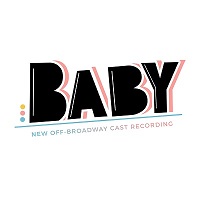 Off-Broadway Cast, 2023 (Yellow Sound Label)
Off-Broadway Cast, 2023 (Yellow Sound Label)  (2 / 5) For the Out of The Box Theatrics production of Baby, which had pre- and post-pandemic runs with slightly different casts in 2019 and 2021, lyricist Richard Maltby, Jr. collaborated with the Off-Broadway company’s leadership on a major revision of the show, including Sybille Pearson’s book. The biggest change is that the characters Pam and Nick are now Pam (Christina Sajous) and Nicki (Gabrielle McClinton), a lesbian couple struggling with IVF. The gorgeous voices and moving performances of Sajous and McClinton are the main reason to listen to this recording, even if the rewritten lyrics range from very effective (the ironic “Romance” works even better in the context of Pam’s injections) to overly on-the-nose (“Look, a turkey baster’s coming your way,” sings Nicki in the opening number). McClinton’s thoughtful “At Night She Comes Home to Me,” featuring some new verses, is also an improvement over the original. Most of the other discernible alterations are minor, including some sort-of-modernizing lyric swaps — such as, among the notable personages and characters name-checked in “I Want It All,” Althea Gibson replacing Scarlett O’Hara and Margaret Atwood replacing Margaret Thatcher. (Very different people!) Four 30-second “Transitions” that were not included in the OBC have made their way onto this recording; they help tie the score together, especially the choral “Transition #3—Commencement.” Johnny Link’s “I Chose Right” is sweetly affecting, and Julia Murney brings appropriate pathos to “Patterns,” but the majority of this album pales significantly in comparison to the superbly produced original recording. It’s hard not to miss Jonathan Tunick’s full orchestrations, which so superbly conveyed the inexpressible immensity of the pregnancy and birth experience. (This new album has some mixing issues, too, with the band often drowning out singers in ensemble moments.) The absence of expansiveness feels especially disappointing in the performance of the score’s greatest asset: the eruptive “The Story Goes On,” here rendered unconvincingly by Out of the Box’s founder Liz Flemming with frequent semi-spoken lines and abrupt shifts in vocal register that work against the song’s epic build. Credit Flemming, though, with giving Baby new life and giving us a ripe reminder of the score’s joys, even if they’re captured more potently on the 1983 cast album. — Dan Rubins
(2 / 5) For the Out of The Box Theatrics production of Baby, which had pre- and post-pandemic runs with slightly different casts in 2019 and 2021, lyricist Richard Maltby, Jr. collaborated with the Off-Broadway company’s leadership on a major revision of the show, including Sybille Pearson’s book. The biggest change is that the characters Pam and Nick are now Pam (Christina Sajous) and Nicki (Gabrielle McClinton), a lesbian couple struggling with IVF. The gorgeous voices and moving performances of Sajous and McClinton are the main reason to listen to this recording, even if the rewritten lyrics range from very effective (the ironic “Romance” works even better in the context of Pam’s injections) to overly on-the-nose (“Look, a turkey baster’s coming your way,” sings Nicki in the opening number). McClinton’s thoughtful “At Night She Comes Home to Me,” featuring some new verses, is also an improvement over the original. Most of the other discernible alterations are minor, including some sort-of-modernizing lyric swaps — such as, among the notable personages and characters name-checked in “I Want It All,” Althea Gibson replacing Scarlett O’Hara and Margaret Atwood replacing Margaret Thatcher. (Very different people!) Four 30-second “Transitions” that were not included in the OBC have made their way onto this recording; they help tie the score together, especially the choral “Transition #3—Commencement.” Johnny Link’s “I Chose Right” is sweetly affecting, and Julia Murney brings appropriate pathos to “Patterns,” but the majority of this album pales significantly in comparison to the superbly produced original recording. It’s hard not to miss Jonathan Tunick’s full orchestrations, which so superbly conveyed the inexpressible immensity of the pregnancy and birth experience. (This new album has some mixing issues, too, with the band often drowning out singers in ensemble moments.) The absence of expansiveness feels especially disappointing in the performance of the score’s greatest asset: the eruptive “The Story Goes On,” here rendered unconvincingly by Out of the Box’s founder Liz Flemming with frequent semi-spoken lines and abrupt shifts in vocal register that work against the song’s epic build. Credit Flemming, though, with giving Baby new life and giving us a ripe reminder of the score’s joys, even if they’re captured more potently on the 1983 cast album. — Dan Rubins

